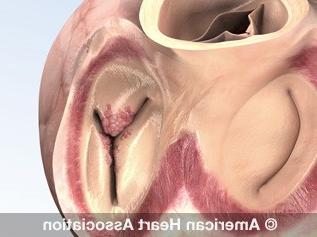Heart Valves and 感染性心内膜炎
什么是感染性心内膜炎?
感染性心内膜炎, 也称为细菌性心内膜炎, is an infection caused by bacteria that enter the bloodstream and settle in the heart lining, 心脏瓣膜心脏瓣膜或血管. IE is uncommon, but people with some heart conditions have a greater risk of developing it.
感染性心内膜炎 refers to infection in the lining of the heart, but also affects the valves. It often affects the muscles of the heart.
There are two forms of infective endocarditis, also known as IE:
- 急性即 — develops suddenly and may become life threatening within days
- 亚急性或慢性IE (or subacute bacterial endocarditis) — develops slowly over a period of weeks to several months.
How do people contract infective endocarditis?
The infection can be caused by bacteria introduced into the blood stream. 感染可由多种来源引起, 包括糟糕的口腔卫生, tooth brushing that causes minor injury to the lining of the mouth or gums, 牙科手术, implanted cardiovascular medical devices, 慢性皮肤病和感染, 伯恩斯, 传染病等. These bacteria can lodge on heart valves and cause infection of the endocardium.
Why does endocarditis pose a threat to the heart valves?
The heart valves are not supplied directly with blood. 因此, 身体的免疫反应系统, including the infection-fighting white blood cells, can't directly reach the valves through the bloodstream. If bacteria begins to grow on the valves (this occurs most often in people with already diseased heart valves), 这种感染很难抵抗, whether through the body’s own immune system or through medications that rely on the blood system for delivery.
Who's at risk for infective endocarditis?
Risk factors for children and young adults include 先天性心脏缺陷 such as malformed valves or a hole in the septum, which allow blood to leak from one part of the heart to another.
Risk factors for adults include previous valve surgeries or a heart transplant, calcium deposits in the mitral valve or in the aortic valve, congenital heart defects or a history of endocarditis.
非法药物使用和IE
If the cause of IE is injection of illicit drugs or prolonged use of IV drugs, the tricuspid valve is most often affected. Street drugs, including narcotics, can also affect the mitral or aortic valve.
What are the symptoms of infective endocarditis?
The symptoms of acute IE usually begin with fever (102°–104°), 发冷, 心率快, 乏力, 盗汗, 关节和肌肉疼痛, 持续的咳嗽, 或者脚肿, 腿部或腹部.
The symptoms of chronic IE may include 乏力, 轻度发烧(99°-101°), 适度较快的心率, 减肥, 出汗, 红细胞计数低(贫血).
Treatment usually consists of IV antibiotics. The choice of antibiotic and the length of treatment is based on the type of infection causing the endocarditis.
Prevention for those at risk usually involves awareness of the risks, and preventative antibiotics prior to certain surgical, 牙科和医疗程序.
相关链接:
- Dental procedures and infective endocarditis
- 下载免费IE钱包卡(PDF)
- Downloadable patient sheet: What is Endocarditis? 英语(PDF) | 西班牙语(PDF)






